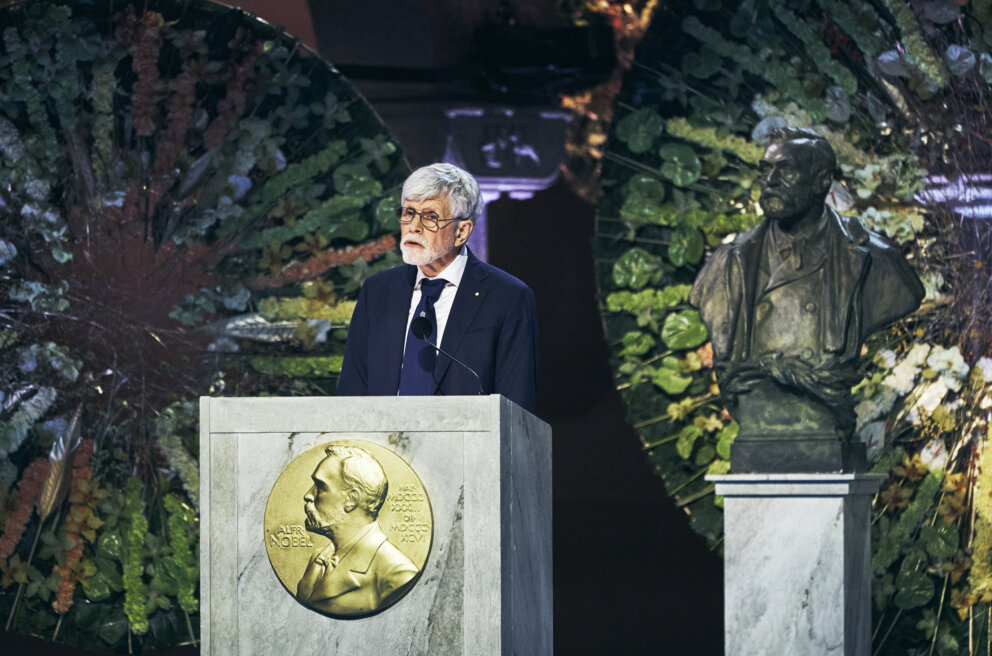Award ceremony speech

Professor Thors Hans Hansson delivering the presentation speech for the 2021 Nobel Prize in Physics.
© Nobel Prize Outreach, photo: Dan Lepp
English
Swedish
Presentation Speech by Professor Thors Hans Hansson, Member of the Royal Swedish Academy of Sciences; Chair of the Nobel Committee for Physics, 10 December 2021
Your Majesties, Your Royal Highnesses, Esteemed Nobel Prize laureates, Colleagues in the International Community of Scholars, Ladies and Gentlemen
Sir Charles Frank said: “Physics is not just concerning the Nature of Things, but concerning the Interconnectedness of all the Natures of Things”, encapsulating the essence of the work of this year’s laureates.
From fluctuations in atoms to turbulence in atmospheres, many emergent properties can only be predicted by recognizing our ignorance of the trajectories of every constituent. Understanding the collective requires a systematic treatment of the tapestry describing the essential processes. Weaving such tapestries involves deep physical insight, computational and mathematical skill, and, above all, perseverance.
Fourier launched the theory of climate in 1824 by invoking invisible “dark heat” emitted by Earth, which we now know is infrared radiation. Modern physical climatology incorporates the pillars of basic physics, from spectroscopy to thermodynamics, from radiative transfer to turbulence. In 1896 Arrhenius constructed the first predictive theory, but it took 70 years, two World Wars and the computer revolution, before Syukuro Manabe completed the tapestry upon which all modern climate models are based.
Edward Lorenz taught us that chaos limits the predictability of the weather to days and yet the climate marches on month by month, year by year. Einstein taught us that pollen grains in water are slowly displaced by rapid collisions with water molecules. Klaus Hasselmann appealed to both, arguing that the chaotic weather is like the water molecules and the climate like the pollen grains. He thereby incorporated fluctuations and variability into climate physics. He carried the analogy further and constructed a framework to quantify the climate signal from the natural climate noise
Together Manabe and Hasselmann provided the basis for the physical modeling of Earth’s climate, quantifying variability and reliably predicting global warming.
A person in bed is in their lowest energy state. Remove the bed and their lowest energy state is the floor. Remove the floor and that state becomes the ground and the process is complete. However, some physical systems never rest. It is as if a person can reside in an infinite number of nearly identical beds but can only really rest in one of them – that is frustrating!
To make glass one melts sand and rapidly cools it. In equilibrium it should again become opaque and yet it persists in disequilibrium, occupying a plethora of very long-lived very similar metastable states. It is perpetually frustrated. Giorgio Parisi embraced the disorder of these “glassy-systems” and constructed a description using many replicas whose energies he could trace mathematically, like families in a genealogical tree.
The energetic landscapes of such frustrated systems are found in regular glasses and their magnetic counterparts, called spin-glasses, in granular matter, in forms of laser light, and many other systems, each frustrated in their own manner. So general are Giorgio Parisi’s predictions that they capture the behavior of a vast landscape of complex disordered systems.
Dr Manabe, Professor Hasselmann and Professor Parisi, you have been awarded the 2021 Nobel Prize in Physics for groundbreaking contributions to our understanding of complex physical systems. It is an honor and a privilege to convey to you, on behalf of the Royal Swedish Academy of Sciences, our warmest congratulations.
Copyright © The Nobel Foundation 2021
Nobel Prizes and laureates
See them all presented here.
